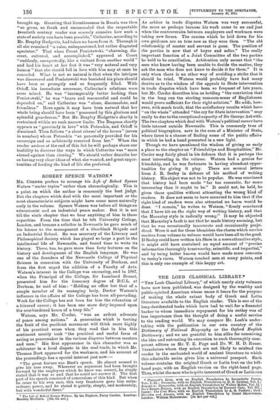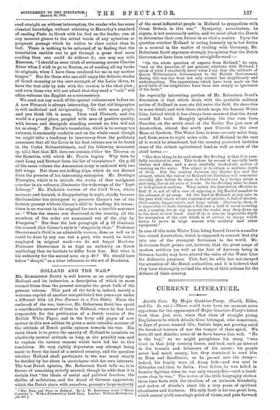THE LOEB CLASSICAL LIBRARY.*
"THE Loeb Classical Library," of which nearly sixty volumes have now been published, was designed by the wealthy and public.spirited American whose name it bears for the purpose of making the whole extant body of Greek and Latin literature available to the English reader. This is one of the long-desiderated tasks which have had to wait for a 'financial backer to whom immediate repayment for his outlay was of less importance than the thought of doing a useful service to the reading world. We may compare Mr. Loeb's under- taking with the publication in our own country of the Dictionary of National Biography or the Oxford English Dictionary ; and we are grateful to him alike for conceiving, the idea and entrusting its execution to ench thoroughly com- petent editors as Mr. T. E. Page and Dr. W. H. D. Rouse. Translators whom they select are not likely to mislead the reader in the enchanted world of ancient literature to which this admirable series gires him a universal passport. Each volume contains the original Greek or Latin text on the left- hand page, with an English version on the right-hand page. Thus, whilst the man who is quite innocent of Greek or Latin can
• Plutareles Uwe, with an English Translation by Bernadotte Perrin,
Procopies, with an Engilels Translation by II. B. Dewing, Vol.!.; XeROPIIAA: Cmcoodia, with an English Translation by Walter Miller, Vol-II.; Ilietars, with an English Translation by Earnest Cary, VoL III.; Caesar: The Cm»! Wars, with an English Tranalation by G. Peskett ; Ceid Heroldn aid Amore., with m English Translation by Giant Showerman. London: William Heinemann. t5s. sot per vol.]
read straight on without interruption, the reader who has some classical knowledge, without attaining to Macaulay 's standard of reading Plato in Greek with his feet on the fender, can at any moment glance to the actual words of any aphorism or pregnant passage which he wishes to chew rather than to -bolt. There is nothing to be ashamed of in finding that the translation enables one to get through a great deal more reading than one could do without it; one may say with Emerson, "I should as soon think of swimming across Charles River when I wish to go to Boston, as of reading all my books in originals, when I have them rendered for me in my mother tongue." But for those who can still enjoy the delicate shades of Greek meaning or the curt strength of the Latin idiom, to have the text aide by side with the version is the ideal plan ; and even those who will not admit that they need a " crib" will often welcome the English as a commentary.
We need not say much of the special volumes now before us. A new Plutarch is always interesting, for that old biographer is still medicinal and invigorating. "Go with mean people, .and you think life is mean. Then read Plutarch, and the world is a proud place, peopled with men of positive quality, with heroes and demigods standing around us, who will not let us sleep." Mr. Perrin's translation, which is to occupy ten volumes, is eminently readable and on the whole exact. though we might infer a tendency to inaccuracy from the prefatory assurance that all the Lives in his first volume are to be found in the Codex Seitenstettensis, and the following statement (p. xiii.) that that MS. does not contain either the Theseus or the Romulus, with which Mr. Perrin begins. Why does he omit Long and Stewart from his list of translators On p. 63 of the same volume the Amazonian army is endowed with two left wings. But these are trifling slips, which do not detract from the promise of his interesting enterprise. Mr. Dewing's Procopins, which is to include the works of that malignant courtier in six volumes, illustrates the wide scope of the " Loeb Library." Mr. Peskett's version of the Civil Wars, whilst accurate and learned, is disappointing in style, chiefly because the translator has attempted to preserve Caesar's use of time historic present without Caesar's skill in handling his tenses: there is no warrant in the original for such a terrible sentence as: " When the senate was dismissed in the evening all the members of the order are summoned out of the city by Pompeius." Nor does the last paragraph of p. 19 illustrate the remark that Caesar's style is "singularly clear." Professor Showerman's Ovid is an admirable version, done as well as it could he done by any one but a poet, who would be better employed in original work—we do not forget Marlowe. Professor Showerman is so high an authority on Greek mythology that we hesitate to differ from him. But what is his authority for the second note on p. 48 ? We should have taken "decepto " as a clear reference to the art of Daedalus.



















































 Previous page
Previous page